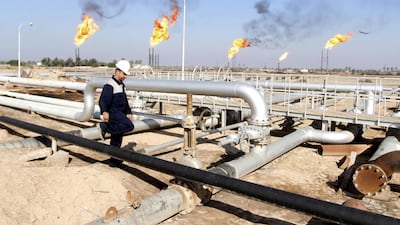Iraq said it was increasing oil exports on Saturday from the southern Basra region by 200,000 barrels per day to make up for a shortfall from the northern Kirkuk fields.
The output from the northern Kirkuk region fell last week in the course of military operations to take it back from Kurdish fighters who have been there since 2014.
The increase in Basra exports keeps Iraq's total output within the quota agreed with Opec, the oil ministry said citing the oil minister Jabar Al Luaibi.
He said 200,000 barrels per day will be shipped from southern Basra export terminal on top of the usual volumes exported daily which exceed 3.2 milllion barrels.
__________
Read more:
Dana Gas, Genel say Kurdistan oil production yet to be disrupted despite conflict
Rosneft moves into Kurdistan with oil deal for five blocks
Oil gains on declining US stockpiles and geopolitical tensions
__________
"These additional volumes will be produced until the northern oil output goes back to its previous level," he said.
Iraq will not be able to restore Kirkuk's oil output to the previous week's levels before Sunday because of missing equipment at two of the largest fields of the region, Avana and Bai Hasan, an oil ministry official said on Thursday.
Until these shutdowns, the northern oil region exported about 530,000 barrels per day, of which about half came from the semi-autonomous Kurdistan region and the rest from the disputed Kirkuk province, claimed by both the Kurds and the Iraqi central authorities.
Kurdish Peshmerga forces deployed in Kirkuk in 2014, when the Iraqi army fled its positions in the face of an advance by Islamic State militants. The Kurdish move prevented the militants from taking control of its oilfields.

